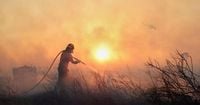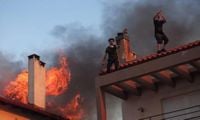Greece continues to grapple with devastating wildfires for a second consecutive day, as flames rage across multiple regions including the Peloponnese, and the islands of Evia, Kythera, and Crete. The relentless blazes, fueled by extreme heat and strong winds, have destroyed homes, forced evacuations, and left significant damage to the country’s natural and agricultural landscapes.
On Sunday morning, July 27, 2025, firefighting aircraft and helicopters resumed their operations at dawn, battling the fires that remained active in several parts of the country. Fire brigade spokesman Vassilis Vathrakogiannis warned that Sunday was expected to be a challenging day with a very high risk of fire across almost the entire territory, though he noted that the overall situation was improving.
Among the hardest-hit areas is the tourist island of Kythera, which has a population of just 3,600 residents. The wildfire there began on Saturday morning and quickly escalated, forcing the evacuation of a popular tourist beach. Evacuation messages were again sent out on Sunday morning as the island continued to face “worrying” windy conditions that fanned the flames. According to Giorgos Komninos, the deputy mayor of Kythera, half of the island has been burned, with homes, beehives, and olive trees destroyed by the fire. He described the situation as “unimaginable destruction” and expressed grave concern for a monastery currently under direct threat.
Komninos also criticized the aerial firefighting response, stating, “If air assets don’t come here, we will burn.” He recounted that a Canadair aircraft arrived, dropped water for about an hour, and then left, leaving the island vulnerable to further damage. The local firefighting efforts are supported by dozens of firefighters, including units from the Czech Republic, alongside three helicopters and two aircraft. Additional assistance is expected from two Italian aircraft later in the day.
Meanwhile, the island of Evia, located near Athens, has seen numerous flare-ups overnight. The fires have ravaged vast stretches of forest and resulted in the deaths of thousands of farm animals. Workers have been laboring since dawn to repair serious damage to Evia’s electricity network, with some villages also facing water supply disruptions.
Further south, on the island of Crete, wildfires that broke out on Saturday afternoon destroyed four houses and a church but were largely contained by Sunday. Crete has been no stranger to wildfires this summer; earlier in July, a blaze there forced the evacuation of 5,000 people.
Closer to the Greek capital, a wildfire swept through the northern suburb of Kryoneri on Saturday, prompting authorities to order evacuations. Residents received SMS alerts instructing them to move to safe areas as the fire raged around the surrounding hills. Greek television footage showed helicopters dropping water on burning houses while 145 firefighters, 44 fire engines, 10 firefighting planes, and seven helicopters battled the blaze. Police have increased their presence in Kryoneri, fearing that looters might target abandoned homes left by residents fleeing the fire. Fortunately, the fire was mostly contained by Sunday.
This year’s wildfires come amid a severe heatwave that has gripped Greece for nearly a week, pushing temperatures above 40 degrees Celsius (104 degrees Fahrenheit) in many areas. On Saturday, the mercury soared to 45.2C in Amfilohia, one of the highest recorded temperatures in recent memory. Meteorologists predict that the extreme heat will begin to ease from Monday, offering some relief to firefighters and residents alike.
Greece has experienced a particularly destructive wildfire season in recent years. In June 2025, fires on Chios, the country’s fifth-largest island in the northern Aegean, destroyed approximately 4,700 hectares (11,600 acres) of land. The year 2023 was especially catastrophic, with nearly 175,000 hectares lost to wildfires and 20 fatalities recorded nationwide.
The ongoing crisis underscores the vulnerability of Greece’s landscapes and communities to climate extremes and the increasing frequency of wildfires. As firefighters continue their battle across the country, the government and international partners are mobilizing resources to support affected regions and prevent further devastation.
Fire brigade spokesman Vassilis Vathrakogiannis encapsulated the gravity of the situation: “Today is expected to be a difficult day with a very high risk of fire, almost throughout the territory.” His words serve as a sobering reminder of the challenges that lie ahead for Greece as it confronts these relentless blazes.
For the residents of Kythera and other affected areas, the scars left by the fires will take time to heal. The destruction of homes, agricultural livelihoods, and precious natural habitats is a harsh blow to communities already grappling with the impacts of climate change. Yet, the resilience and determination of firefighters and locals alike offer a glimmer of hope amid the smoke and ash.
As the flames continue to be fought, the world watches closely, reminded once again of the urgent need to address the environmental and societal factors that contribute to such disasters. Greece’s wildfire crisis is not just a national emergency but a call to action for global solidarity and sustainable solutions.





